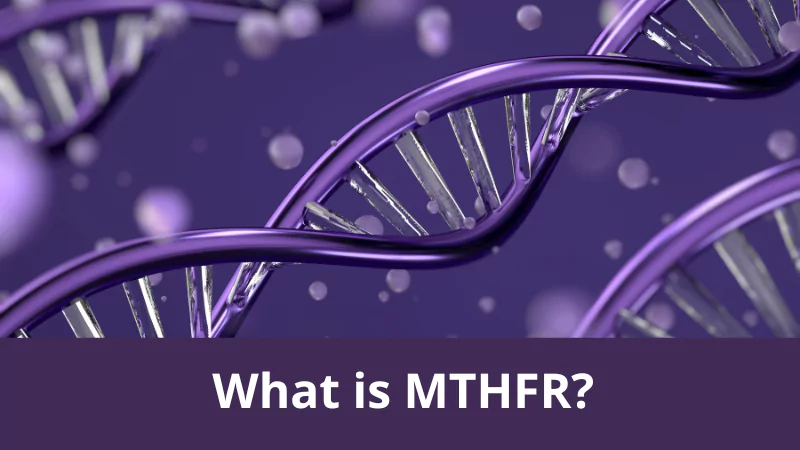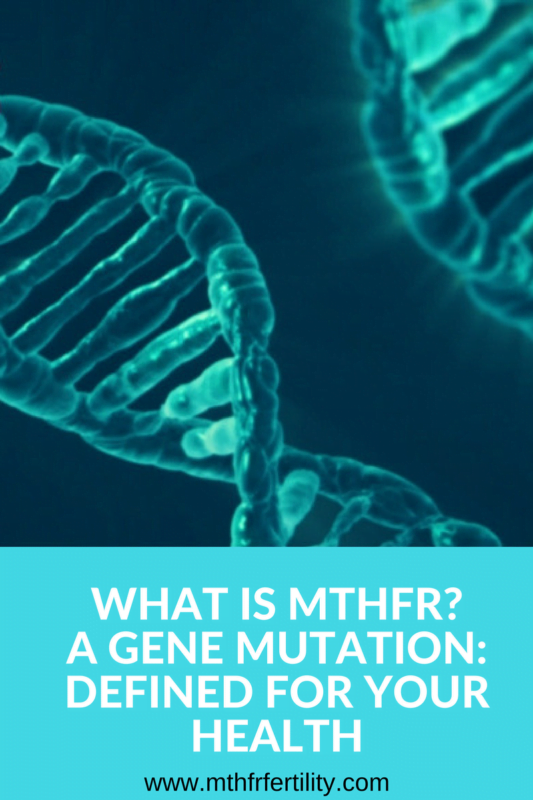Imagine if there was a tiny switch in your body that turned things on and off and this switch controlled vital processes like detoxifying harmful substances, producing energy, reducing toxic estrogen and even supporting your mood…
Well, in a way there is one! This switch is a process called methylation and it relies heavily on an enzyme called MTHFR (methylenetetrahydrofolate reductase). For many people, variations in the gene that codes for the MTHFR enzyme can make this switch work less efficiently, affecting everything from energy levels to fertility to mental well-being [1].
Methylation: The Body’s Light Switch
Think of methylation as a light switch—turning on important processes like detoxification, DNA repair, and hormone balance while turning off harmful ones, like tumour-promoting genes [2]. When methylation doesn’t work properly, it can impact many aspects of health, including inflammation levels, fertility, hormones, detox ability, and even how you handle stress [3].
Have you ever wondered why some people can handle stress with ease while others feel overwhelmed by the smallest setbacks? Those with certain MTHFR genetic variations often struggle more with stress and anxiety because their bodies don’t efficiently produce the active folate needed to support neurotransmitter function [3]. If you constantly feel like you’re on edge or battling mood swings, your genetics may play a role.
Understanding MTHFR Gene Variants
First let’s define what your test results show you.
Your parents have two copies of each gene and they will randomly give you one of theirs so you also have two copies. For all genes there is an ‘expected’ DNA sequence. This was defined in the Human Genome project that was launched in 1990 and completed in 2003. Essentially this project provided the fundamental information about the human blueprint – what was the expected sequence of all genes.
So we know what every gene should look like. A polymorphism (new name for a mutation) means that you have a gene that is a different sequence from what we ‘expect’. Now that’s not all bad, because in some cases this doesn’t matter and makes no difference to our body, but sometimes it affects an enzyme making it work faster, slower or not at all (deleted).
So your parents randomly donated one of the MTHFR genes to you. If you got two copies that are different to the expected sequence we call that ‘homozygous’, one copy ‘heterozygous’ and those that are exactly like the expected sequence ‘wild type’
So with that information now lets look at some specifics – if you have a polymorphisms in the MTHFR gene then your enzyme is downregulated. That means you do not make methyl folate as best you should, which means your methylation capacity is likely down regulated.
Not all MTHFR gene variations are the same. The two most common are:
- C677T Variant (rs1801133): This variation can reduce enzyme activity by up to 70% in people with two copies of the mutation. It’s linked to higher homocysteine levels, a risk factor for heart disease, neural tube defects, and pregnancy complications [4].
- A1298C Variant (rs1801131): While this variant has a smaller impact on homocysteine levels, it has been associated with neurotransmitter imbalances, mood disorders, and chronic fatigue [5]. People with one copy of C677T and one copy of A1298C (compound heterozygotes) may experience more significant metabolic challenges.
The Role of Folate in Methylation
Folate, also known as vitamin B9, plays a crucial role in methylation. It helps your body create DNA, repair cells, and regulate brain chemicals like serotonin and dopamine [6]. Natural folate is found in leafy greens, legumes, and liver, but many people rely on folic acid, the synthetic version added to fortified foods. The problem? If you have an MTHFR mutation, your bodymay not convert folic acid into its active form, 5-MTHF (5-methyltetrahydrofolate) [2]. Why? Because folic acid is metabolised differently to active folate. It uses an enzyme called dihydrofolate reductase (DHFR) to convert to active folate. More than 200mcg-300mcg per day of active folate (the equivalent to a few pieces of bread) actually gets stuck, causing excess folic acid to build up and this has been linked to adverse health conditions.
For those with MTHFR mutations, supplementing with methylated folate (5-MTHF) instead of folic acid may be a game-changer. It bypasses the inefficient enzyme, ensuring your body gets the folate it needs for vital functions [3].
Important! We don’t recommend you start taking 5-MTHF or activate B’s straight away! You need to assess whether you have a methylblock first! (more on this in an upcoming blog!)
How MTHFR Impacts Your Health
If your MTHFR enzyme is down regulated, it can lead to:
✔ Higher homocysteine levels, increasing cardiovascular risk [4].
✔ Reduced detox ability, making it harder to clear toxins, heavy metals, and estrogen [6].
✔ Increased inflammation, which contributes to conditions like autoimmune diseases and chronic pain [5].
✔ Mental health challenges, including anxiety, depression, and brain fog [3].
✔ Infertility and pregnancy complications, due to impaired folate metabolism [5].
More toxic estrogen, estrogen dominance like fibrocystic ovaries, fibrocystic breasts, fibroids, endometriosis, weight gain and PMS.
Why Knowing Your Genes Matters
Understanding if your MTHFR enzyme is downregulated and by how much, can empower you to make personalised health choices. Genetic testing can reveal whether you have these variations, allowing you to take targeted steps to support methylation [7].
But remember… genetics is only part of the equation—your lifestyle, diet, and environment also play a role in how these genes express themselves, and hence how your enzymes function.
This brings us to an important topic: Epigenetics.
Epigenetics: You Are More Than Your Genes
Epigenetics—the study of how lifestyle choices affect gene expression—shows that diet, stress, and toxin exposure all impact how genes function [8]. So essentially what that means is you cannot do anything about the genes you were given in utero, but you can do something about the way they act. For example, if MTHFR is down regulated, we can make up for the lack of methylfolate by supplementing with activated folate at doses that are right for you. We can then advise on what environmental influences may use more methyl folate than others – for example stress is a big player because it uses more methyl groups up than anything else.
Which means while MTHFR variations can influence your health, you are not defined by your genes. By making conscious health choices, you can support your body’s methylation pathways and optimise your well-being.
How to Support MTHFR and Methylation Naturally
✔ Eat folate-rich foods like spinach, asparagus, and lentils [6].
✔ Choose methylated B vitamins (B6, B12, and folate) instead of synthetic forms [9]. And watch out for foods fortified with the synthetic folic acid. E.g. commercial breads, biscuits and pastas.
✔ Reduce toxin exposure by avoiding processed foods, pesticides, and heavy metals as these can block your utilisation of folate[8].
✔ Manage stress through mindfulness, exercise, and adequate sleep as high stress and cortisol depletes your b-vitamins and methyls quickly [8].
✔ Support detox pathways with nutrients like glutathione, magnesium, and zinc [10].
Of course, this may sound like generic advice that you’ve heard a thousand times.
If you really want to learn the SPECIFICS of what is right for your body and genes, then there is no better option then getting an expert to help you. Book in for one of our genomic health packages – this is where you get your full DNA test AND a consultation to guide you through the process.
Final Thoughts: Take Charge of Your Health
MTHFR may just be one gene, but it can have a big impact on health, especially if it’s been slowed down further by lifestyle and environmental factors. If you’ve been struggling with fatigue, mood issues, infertility, anxiety or unexplained health challenges, looking into your methylation and folate status could be key. The good news? By understanding how your body works, you can take simple, proactive steps to support your health, naturally.
Here’s a few resources we recommend to start your journey to optimal health with MTHFR
- Get the MTHFR Basics Course: Diet and Lifestyle Strategies For People with MTHFR SNPS
- Join our Patient Knowledge Centre – this hub is filled with hundreds of hours of training for all aspects of health.
- Get a 1-on-1 health consultation with one of our qualified experts
Wherever you decide to start your journey, the most important thing to remember is – you can live an extremely healthy and happy life with MTHFR variations, you just need to have the knowledge and tools to support your genes. And that’s what MTHFR Support Australia was created for!
References
- Raghubeer S, Matsha TE. Methylenetetrahydrofolate (MTHFR), the one-carbon cycle, and cardiovascular risks. Nutrients. 2021;13(12):4562. doi:10.3390/nu13124562.
- Vidmar Golja M, Šmid A, Karas Kuželički N, Trontelj J, Geršak K, Mlinarič-Raščan I. Folate insufficiency due to MTHFR deficiency is bypassed by 5-methyltetrahydrofolate. J Clin Med. 2020;9(9):2836. doi:10.3390/jcm9092836.
- Tiffon C. The impact of nutrition and environmental epigenetics on human health and disease. Int J Mol Sci. 2018;19(11):3425. doi:10.3390/ijms19113425.
- Guo J, Hao X, Wang R, et al. MTHFR polymorphism’s influence on the clinical features and therapeutic effects in patients with migraine: An observational study. Front Neurol. 2022;13:1074857. doi:10.3389/fneur.2022.1074857.
- Ledowsky C, Steel A, Schloss J. MTHFR genetic polymorphisms and the risk of infertility in couples accessing assisted reproductive technologies: A systematic review. Adv Integr Med. 2021;8(3):220–229. doi:10.1016/j.aimed.2021.05.004.
- Ledowsky C, Mahimbo A, Scarf V, Steel A. Women taking a folic acid supplement in countries with mandatory food fortification programs may be exceeding the upper tolerable limit of folic acid: A systematic review. Nutrients. 2022;14(13):2715. doi:10.3390/nu14132715.
- Yadav HM, Jawahar A. Environmental factors and obesity. In: StatPearls. StatPearls Publishing; 2024. http://www.ncbi.nlm.nih.gov/books/NBK580543/.
- Lyon P, Strippoli V, Fang B, Cimmino L. B vitamins and one-carbon metabolism: Implications in human health and disease. Nutrients. 2020;12(9):2867. doi:10.3390/nu12092867.
- Parra M, Stahl S, Hellmann H. Vitamin B₆ and its role in cell metabolism and physiology. Cells. 2018;7(7):84. doi:10.3390/cells7070084.








